Attorney Wayne E. Waite, President of the Shoulder to Shoulder Board, and Dwight Armstrong, Secretary for the Shoulder to Shoulder Board and CEO of Future Farmers of America (FFA), bopped around the Frontera this week with a maddening schedule. Everyone wants to get the ear of the boss. With only few days until the StoS board meeting in Tegucigalpa, important issues demand attention. Laura and I met up with them in Camasca at the Good Shepherd School. We had never met Wayne nor Dwight. First impressions are so very important; for the third time since I’ve been in Honduras, I donned a button-down, collared shirt.
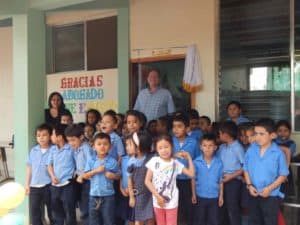 The children hosted a festive celebration and a classroom was named in Wayne’s honor. Pomp and circumstance to serious deliberations, critical, tense meetings dominated the afternoon. Still, Wayne had time for the contractor working on the newly begun construction of a second school building. Standing on planks suspended over the foundation, I translated and learned how this man had built most of StoS’s clinics, starting with our first at Santa Lucia. For all the attention being given to Wayne, how important was it to honor this man’s humble contribution; a builder who knows the import of strong foundations. Meetings piled onto meetings without any breathing space. Sometime mid-morning, Wayne and Dwight ran down to the mayor’s office to attend a presentation by the local contingent of the FAO (Food and Agricultural Organization of the United Nations).
The children hosted a festive celebration and a classroom was named in Wayne’s honor. Pomp and circumstance to serious deliberations, critical, tense meetings dominated the afternoon. Still, Wayne had time for the contractor working on the newly begun construction of a second school building. Standing on planks suspended over the foundation, I translated and learned how this man had built most of StoS’s clinics, starting with our first at Santa Lucia. For all the attention being given to Wayne, how important was it to honor this man’s humble contribution; a builder who knows the import of strong foundations. Meetings piled onto meetings without any breathing space. Sometime mid-morning, Wayne and Dwight ran down to the mayor’s office to attend a presentation by the local contingent of the FAO (Food and Agricultural Organization of the United Nations).
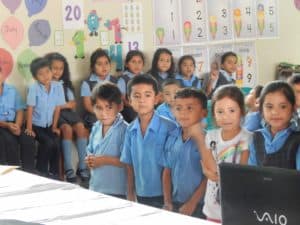 Dwight has dedicated his life to agriculture, particularly the education and inclusion of youth in health and nutrition and the sustainable management of our earth’s produce. Shoulder to Shoulder is taking interest in agriculture and food security in the Frontera. Almost everyone farms on the Frontera. It is about the only thing here that resembles what might be considered a job. Mostly it’s subsistence farming. FAO’s presentation was about moving people beyond that; where education and sustainable structures empower people with production and pride. It was an impressive presentation; a well-thought out, well-designed, systematic response with real opportunity for change. StoS clearly could partner with such a program and mission. Food security is another means to assist the journey from poverty to dignity. Dwight was impressed and enthused.
Dwight has dedicated his life to agriculture, particularly the education and inclusion of youth in health and nutrition and the sustainable management of our earth’s produce. Shoulder to Shoulder is taking interest in agriculture and food security in the Frontera. Almost everyone farms on the Frontera. It is about the only thing here that resembles what might be considered a job. Mostly it’s subsistence farming. FAO’s presentation was about moving people beyond that; where education and sustainable structures empower people with production and pride. It was an impressive presentation; a well-thought out, well-designed, systematic response with real opportunity for change. StoS clearly could partner with such a program and mission. Food security is another means to assist the journey from poverty to dignity. Dwight was impressed and enthused.
Good systems and good mission colored the day’s theme. Wayne is the responsible party for those good systems built around good missions. Still, it can be so draining because the demands are very high, there is always a greater need. Expand the mission, build another system. It all looks perfect on paper, but spits, sputters, and whines in operation. But lasting meaningful change demands close attention to the soundness of the mission and the effectiveness of the systems. By late Wednesday afternoon, Attorney Waite and Mr. Armstrong were deep into the forest of what is Shoulder to Shoulder. But what about the trees?
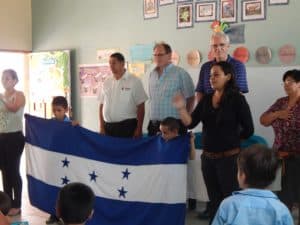 Laura and I were anxious to get back to Concepción. It was late, and if we were to walk, we hoped to avoid nightfall. Wayne overheard us and declared that he was going to Concepcion and would take us. This surprised everyone. It wasn’t on the schedule, he hadn’t eaten yet, and he would likely return late. He insisted that he was going, graciously offering us a ride, but secretive as to the purpose of his trip. Being the boss, he gets what he wants.
Laura and I were anxious to get back to Concepción. It was late, and if we were to walk, we hoped to avoid nightfall. Wayne overheard us and declared that he was going to Concepcion and would take us. This surprised everyone. It wasn’t on the schedule, he hadn’t eaten yet, and he would likely return late. He insisted that he was going, graciously offering us a ride, but secretive as to the purpose of his trip. Being the boss, he gets what he wants.
Half way down the mountain, Wayne asks if we wouldn’t mind accompanying him on a short side-trip to Guachipilincito. There is no such thing as a short side-trip in the Frontera, and we were aware it would be more than an hour out of the way. But clearly this was the revelation of Wayne’s secret mission. Our curiosity won out over our tiredness and we agreed to accompany Wayne and Dwight to Guachipilincito. After the onerous, jolting ride down the rocky, single lane road, we sit in our car in the center of town. It’s dark and no one’s out. After a cell phone call, the town nurse arrives. She gets in our car and directs us a short distance to a house. In the small house, sparse furnishing greets us: one, maybe two, straight-backed chairs, a variety of hand tools hanging here and there, and a unfinished, wooden table. Hammocks suspend from the ceiling substituting for beds. Another room or two might lurk behind curtained doors, but there is little more space. The nurse, who the family knows, and five American strangers enter the woman’s home. She welcomes us (as if this were an everyday occurrence); the cultural demand of hospitality not allowing anything but graciousness. The matriarch, probably in her late thirties or early forties appearing to be in her sixties, stands above her eldest daughter. The daughter holds her tiny baby; a newborn, anyone would surmise. Two other younger brothers stare at us; the older of whom is clearly mentally challenged. The rawness of poverty breathes here. Wayne bends down to the baby, and, through the translator, the child’s grandmother converses, answering questions meant for the mother. The child is ten months old and weighs eleven pounds. His mother is fifteen. One month ago, the baby only weighed six pounds so they are encouraged that the baby is finally retaining some nutrition and weight. Wayne gives the grandmother a plastic bag that includes two cans of baby formula.
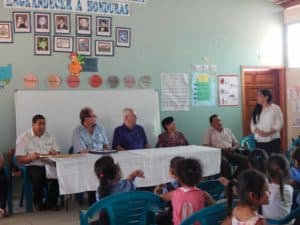 In the car, the nurse discloses that the father is twenty-five, not at all present, and initially denied he was the father. He has done nothing to support the child or the fifteen year old mother. After much fighting, finally he agreed to give the family about seventeen dollars a month. StoS assisted the family through the difficult pregnancy and birth, monitored the progress of the child, and has provided the medical care and nutritional supplements. There was no particular need for Wayne to buy or deliver the formula. Still, this was Wayne’s secret mission.
In the car, the nurse discloses that the father is twenty-five, not at all present, and initially denied he was the father. He has done nothing to support the child or the fifteen year old mother. After much fighting, finally he agreed to give the family about seventeen dollars a month. StoS assisted the family through the difficult pregnancy and birth, monitored the progress of the child, and has provided the medical care and nutritional supplements. There was no particular need for Wayne to buy or deliver the formula. Still, this was Wayne’s secret mission.
Missions need to be developed, structures and systems designed and implemented, accords signed, clinics and schools built, education provided, complaints addressed, relationships forged, people served, and a thousand other things attended to. In Shoulder to Shoulder’s next mission, we will do our best to partner with Honduran farmers, local governments, and other well-intentioned agencies to establish food security in the Frontera. But a sound mission and an effective system is not enough to satisfy the hunger of the heart.
Doing Good
April 9, 2015
The University of Wyoming saw over 300 persons at their clinic in Agua Salada last week. Being Holy Week we had some concern that they might not have as many patients as they would on a normal week. But, Wyoming’s clinic is well established with developed relationships of trust. Regardless of the week, the people turn out. Laura and I visit them twice, but because they are so busy, we have little time to engage with the brigade members. Mostly we just observed the coming and goings of the residents and their interactions with the students, nurses, dentist, and doctors.
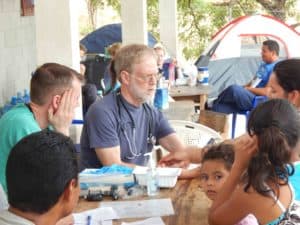
We recognized an older woman who had also come to the clinic when Wyoming was last here in November. She would be memorable to almost anyone; that soft, grandmotherly look and manner that inspires you to want to care for her. She’s trying on reading glasses. She had done the same thing at the last brigade and I recalled that she didn’t have a need for reading glasses. Perhaps her memory is a little challenged. This time as before, two or three brigade members come to assist her. I inform them that she doesn’t need reading glasses. They ask her if she has difficulty reading and she answers that she doesn’t read. “What about sewing? Can you see the material and the thread?” “Yes,” she responds, “I can sew just fine.” She’s disappointed when they explain to her, as they had at the last brigade, that wearing reading glasses for her poor distance sight would not help her, and might even hurt her. Still, she and the brigade members are having a great time, laughing and conversing. Solicitous of her, the brigade members search out ways to help her. I think that they already had.
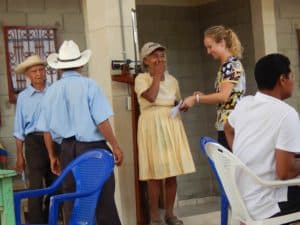
Laura spoke with one of the brigade members, thanking him for all the good work Wyoming is doing. He asked, sincerely, if in fact they really are doing any good. It’s a jarring question. A lot of brigades either never ask it, or answer it quickly and affirmatively to avoid their personal insecurity. But the question is the beginning of discernment, the beginning of mission. Everyone wants to feel helpful. It’s another thing entirely to actually be helpful. The former is about ego. The latter is about commitment. The question itself provides the map outlining the journey from ego to commitment.
On our second visit there was a meeting with the community leaders. The clinic has never been part of the Honduran health system and therefore has only been open when the University of Wyoming is present on brigade. The situation has changed now and there is a possibility for the clinic to be operational on a daily basis. This would mean regular health care for the inhabitants of Agua Salada and the surrounding areas. The community leaders expressed gratitude and praise for the committed individuals who have been coming to their village for years. They even spoke about memorializing them by hanging their photos on the walls. Then the community leaders expressed the fear they were feeling. If the clinic becomes part of the Honduran medical system would that mean that Wyoming would stop coming? Wyoming answered the question definitively. No, they would continue to come. They would continue to provide health care. They would stand by the side of the community as they developed. This response eased the fears of all present.
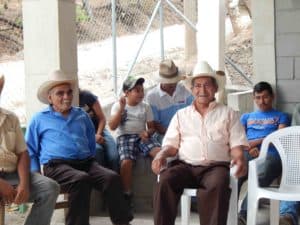
Is the University of Wyoming doing any good for the community and individuals of Agua Salada? Well, they built a clinic here. They’ve provided health care for years. The community is now poised to obtain regular, ongoing health care. They are known and respected by the residents. The community wants them to continue coming. Wyoming is committed to standing by their side. But even with all of that, the question is a scary one to ask, and even more elusive to answer. Though it is so tempting to document proof of our generosity, “good” is not subject to empirical measurement. It is only and always a thing of the heart.
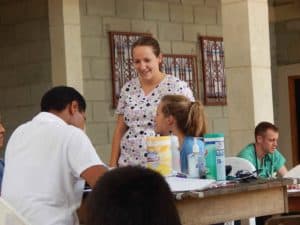
When Wyoming next returns to Agua Salada, I suspect we’ll see the older woman return again. She will again search the reading glasses, again be dismayed that the glasses will not help her, and again find comfort in gathering around her two or three young Americans. They’ll talk and laugh and gently lead her about, searching out ways that they might help her. Once again, the question will be asked. Once again, the answer will elude us. The question, however, is so much more important than the answer.
Holy Week
April 3, 2015
Every brigade arriving here brings particular gifts as individuals and a particular dynamic as a group. Baylor College of Medicine has been here during this Holy Week under the direction of Dr. Sandra Williams. Laura and I present ourselves to brigade groups as advocates, both for their time here as well as for their continuing relationship with Shoulder to Shoulder. We attempt to discern why they’ve come to Honduras, what they want to achieve, and what are their reactions to being in an unfamiliar world. The Baylor brigade presented a great challenge to answering those questions.
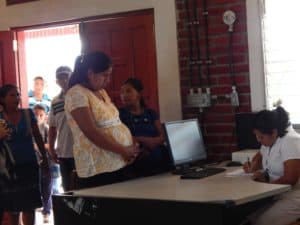
Sometimes the discernment is easy. We meet an eighteen year old pre-med student with that deer-in-the-headlights sort of look and immediately know to give support and guide her experience. On the other side of the coin is the veteran brigade member who comes with great passion and energy. With him, we celebrate his sense of commitment and service. No one from the Baylor brigade fits either type. It is not that they present as distant or defended. On the contrary, they’ve been very engaging. But, their experience and background has well seasoned them. They are grateful to be here, and though the experience here is a new one, it is not something to either frighten or astound them.
They specialize in emergency medicine and work the emergency department in a Houston Hospital. They are familiar with tragedy and trauma. At the lunch table, they get along so well that I ask if they met with one another prior to coming to Honduras. Dr. Morrical answers me, “No, we didn’t do any team building. We just know one another because we work together.” From there the ER stories begin, punctuated with gallows humor that offers them a refuge and a sense of community. They know how to be kind to one another and how to be compassionate towards those in crisis.
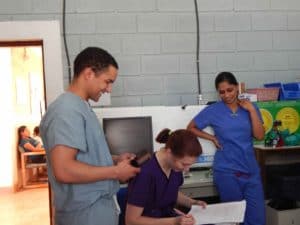
They bring this with them to Honduras and the persons they see and treat. Still, there is even more reason for the aura of ease and familiarity that surrounds them. No one is from Texas, all of them imported there from other parts of the country and the world. Different backgrounds, races, and cultures have formed and honed their personal values of human dignity and respect. Theron, the Medical Resident from Arizona, and Rachel, the soon-to-be Yale Medical Resident from Maryland, are from mixed-race backgrounds. Gursaran’s gift is her Indian culture and she jokes of Western medicine and its insistence that there be a pill for every ailment. Angel is from the Dominican Republic, but wittingly comments that he is the only Domincan that spent a great portion of his life in Wisconsin (he has a weakness for cheese curds). I watch Angel giving a consult to a pregnant woman that has just had an ultrasound. His Spanish is excellent, of course, but rings with Caribbean flavor. He is poised, confident, and competent. He is accepted and accepting. They bring all of this also to Honduras and the persons they see and treat.

It is Holy Week in Honduras. Almost everything closes down and patients are not lined up at the clinic doors. They see patients, however, and they are likely seeing the patients in the greatest need. It is important work, specialized work in ultrasound screenings and emergency medicine. Still, they have some free time. They walk down to the waterfall and the river. Not a long walk, but a steep hill under tremendous heat. On vacation, the families have gathered there for picnics and fun. The brigade group must seem out of place among them. They are probably aware of how different they are. But then again, they are not here because they are the same. They are here because they are different; knowing, as many of us still have yet to learn, that diversity is not something to be feared and shunned, but rather, something to be embraced and celebrated.

They’re only here for a week, this Holy Week, and that’s too bad because any one of them, or all of them, could just as well live and work here. Their openness and respect to the diversity of human life and experience is a gift to the persons they are present to here in Honduras. Then again, it will be a gift to whomever they meet and serve wherever they may be.


